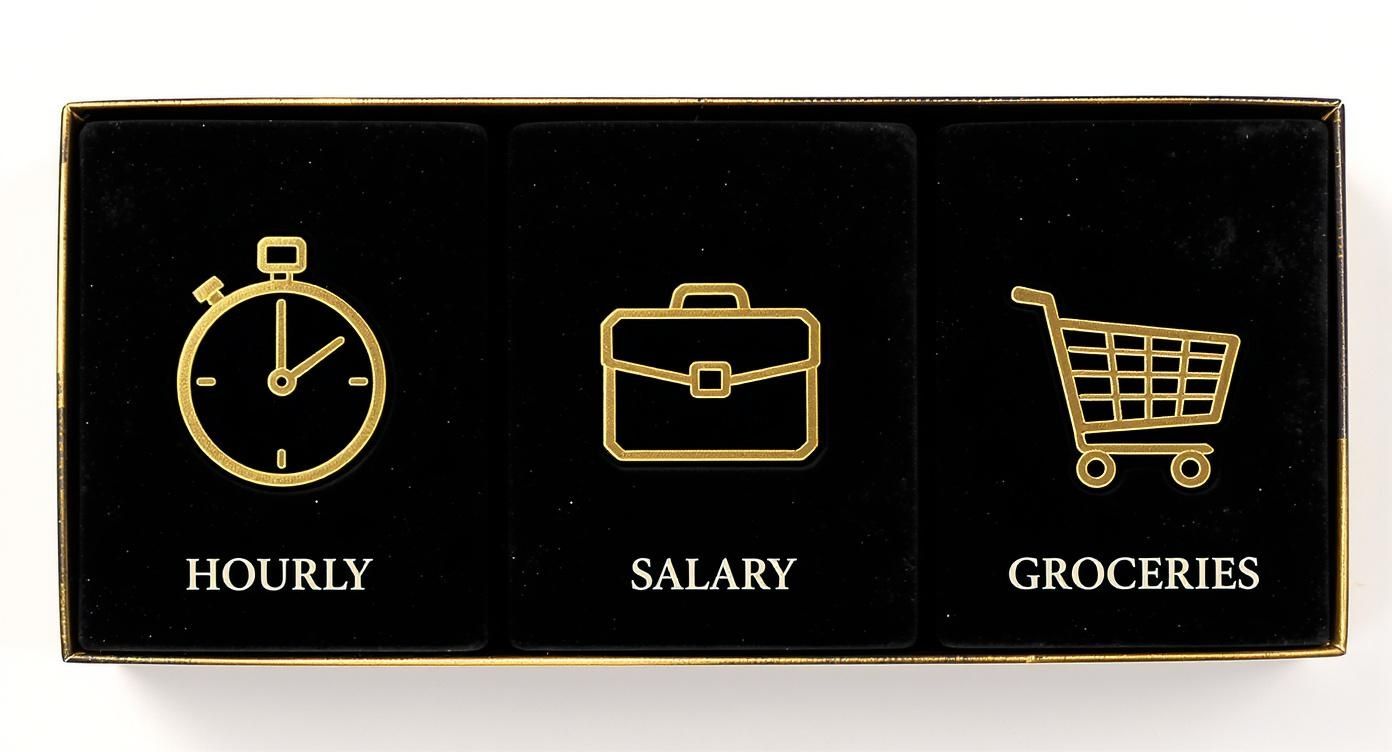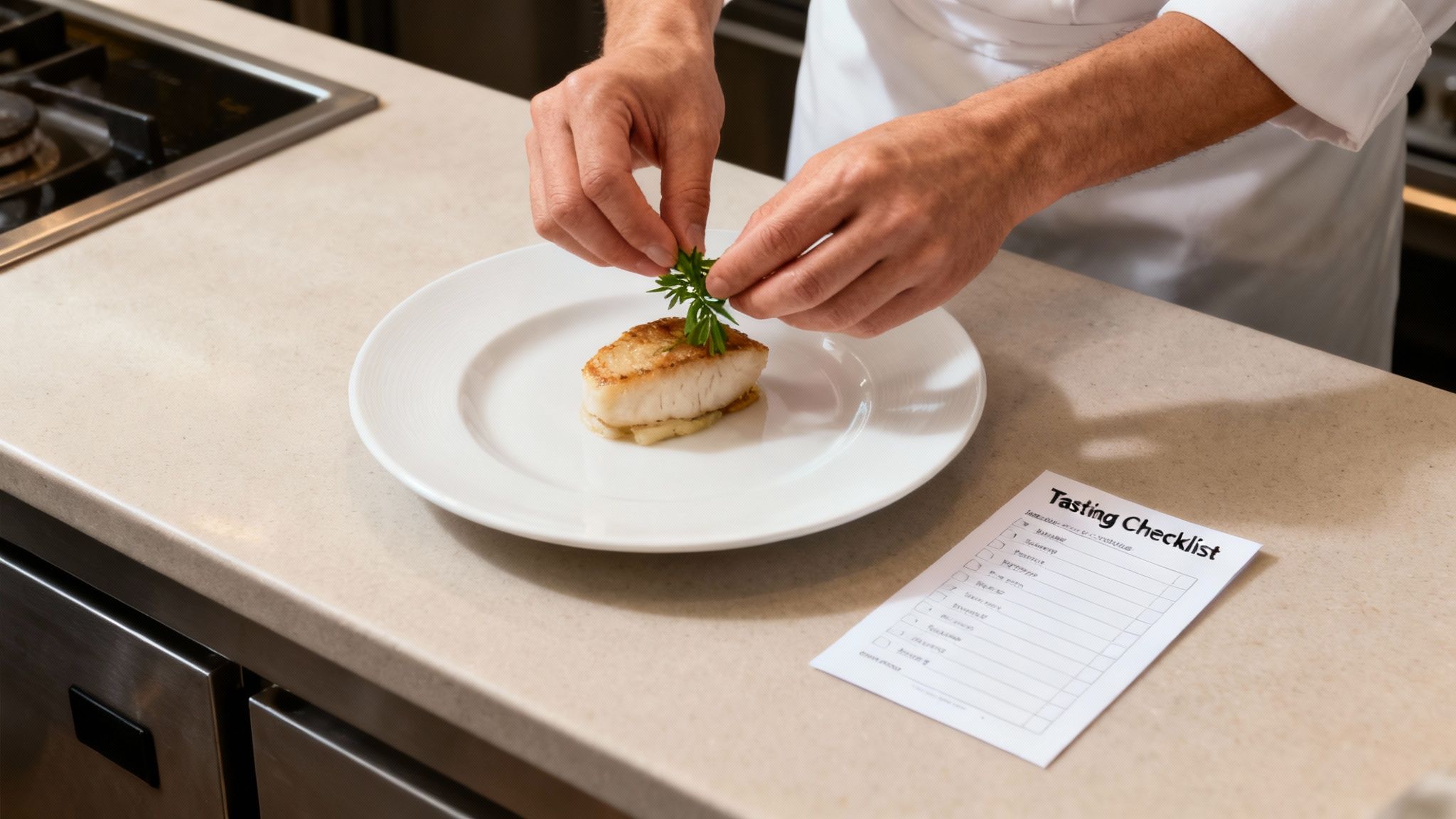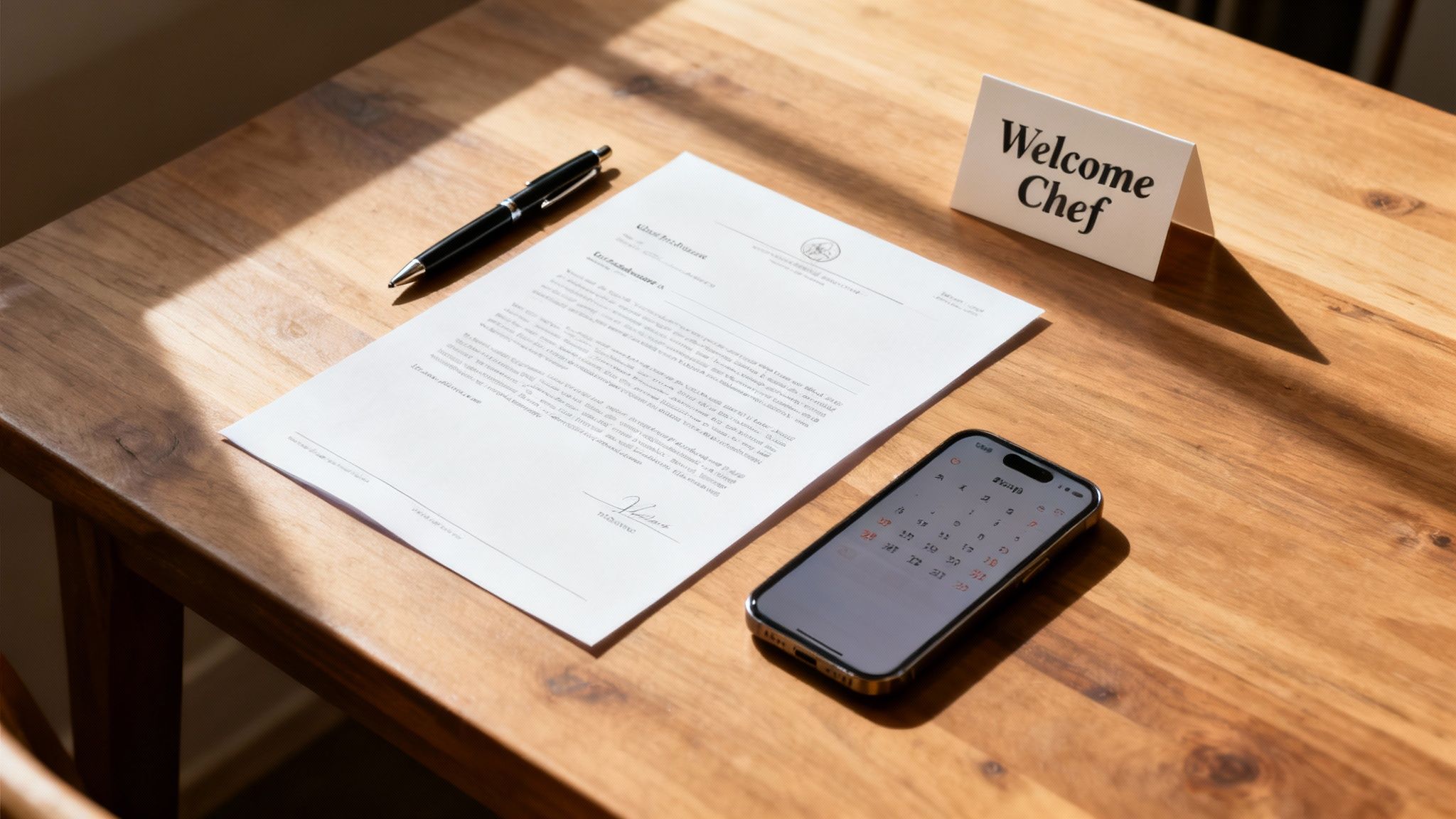Hiring a Private Chef Your Definitive Guide
Before you start looking for the perfect private chef, you need to get a handle on the costs. It’s a wide spectrum, from $75-$150 per hour for a special event to annual salaries that can easily clear $100,000. The final number really depends on the chef’s background, where you live, and how complex your culinary needs are—plus the cost of groceries, which is almost always separate.
Setting Your Budget And Expectations
First things first: let’s talk money. Before you even think about interviewing chefs, you need a clear financial roadmap. Hiring a private chef isn’t just about paying for meals; it’s a real investment in your lifestyle, your health, and your most precious asset—your time. Figuring out the costs upfront saves everyone from surprises and helps you find a pro who fits comfortably within your budget.
This infographic breaks down the key cost components you’ll run into.

As you can see, the chef’s service fee is completely separate from the grocery bill. That’s a crucial detail to remember when you’re mapping out your weekly or monthly food expenses.
Comparing Private Chef Pricing Models
Here’s a look at the common pricing structures you’ll encounter when hiring a private chef.
| Service Type | Typical Cost Structure | Best For |
|---|---|---|
| Full-Time Live-In/Live-Out | Annual Salary + Benefits | Families or individuals needing daily, dedicated culinary service. |
| Part-Time or “Cook Dates” | Hourly Rate ($75-$150/hr) or Per-Meal Fee | Busy professionals or families who want several days’ worth of meals prepared once or twice a week. |
| One-Time Special Events | Flat Fee or Per-Person Rate | Dinner parties, holiday gatherings, or milestone celebrations. |
Each model offers different benefits, so think about what your week looks like and which structure gives you the most value.
Factoring in Salaries and Other Expenses
For a full-time chef, salaries can really vary. We’re seeing an average annual salary of about $113,000 for private chefs in the U.S., but in high-demand cities, top-tier talent can command over $200,000. This jump in pay reflects a growing need for specialized skills, whether it’s managing severe allergies, mastering global cuisines, or creating wellness-focused menus.
Beyond the chef’s direct pay, always remember to budget for groceries. This is usually handled as a separate, reimbursable expense. It’s a great idea to discuss your ideal food budget with potential chefs to make sure their sourcing style lines up with your expectations, whether you’re an organic farmers’ market regular or prefer stocking up at bulk suppliers. If you need a good primer on service costs, looking at examples of understanding event service budgets can offer some helpful parallels.
The real value isn’t just in the food itself, but in the hours you reclaim. Think of the time saved from meal planning, grocery shopping, cooking, and cleaning—it often adds up to 10-15 hours per week.
Ready to dig a little deeper into the specific pricing models you might come across? Check out our detailed guide on what a personal chef costs. It’ll give you everything you need to build a realistic and sustainable budget for your culinary needs.
What’s Your Ideal Culinary Experience?

Before you even think about posting a job ad or calling an agency, let’s get one thing straight: the “perfect chef” is different for everyone. It’s a personal thing.
The right chef for a retired couple wanting simple, healthy meals is a world away from the professional who can pull off elaborate weekend dinner parties for a dozen guests. If you get clear on what you need upfront, the whole process becomes so much smoother. Trust me on this.
You’ve got to think beyond just “good food.” It’s time to map out your family’s culinary personality and the rhythm of your daily life.
Pinpointing Your Tastes and Dietary Needs
First things first, what do you and your family genuinely love to eat? Are we talking rustic Italian, clean Japanese, modern American, or something else entirely? And just as important, what do you not want to see on your plate?
This is where you need to get really specific, especially with dietary requirements. For many people, this is the number one reason they hire a chef in the first place. List everything, no matter how small it seems.
- Allergies and Intolerances: Note any serious allergies like nuts, shellfish, or dairy. Don’t forget intolerances like gluten or lactose.
- Health-Driven Diets: Are you following a specific protocol like vegan, paleo, keto, or low-FODMAP?
- General Preferences: Do you lean towards organic ingredients? Locally sourced produce? Do you prefer grilling over frying?
Managing dietary restrictions takes real skill and knowledge. If this is a big priority for you, our guide on cooking for food allergies is a great resource for understanding what a professional chef should be able to handle.
Matching a Chef to Your Lifestyle and Service Style
Next up is logistics. How will a chef actually fit into your home and daily routine? This is just as critical as the food they cook.
Your ideal chef should match the rhythm of your household. A chef who excels at formal, plated dinners might not be the best fit for a family that prefers casual, help-yourself meals throughout the week.
Start asking yourself the practical questions. Are you looking for someone to cover breakfast, lunch, and dinner every day? Or maybe just a few times a week for some serious meal prep? Will the chef be handling all the grocery shopping, menu planning, and kitchen cleanup, too?
Defining these duties now prevents a world of misunderstanding later. Once you have this detailed profile hammered out, your job description will act like a magnet, attracting exactly the right culinary talent for your home.
Where to Find—and How to Vet—the Best Chefs
Alright, you’ve got a clear vision and a budget. Now for the fun part: finding your culinary pro.
Let’s be honest, you won’t find the caliber of talent you’re looking for on standard job boards. The truly great private chefs are discovered through channels that are a bit more exclusive. I always tell my clients to start with specialized private chef agencies. They’re worth their weight in gold because they do the heavy lifting—initial screening, background checks, and skill verification—before a candidate ever reaches your inbox. It saves an incredible amount of time and adds a crucial layer of security.
Another fantastic route is tapping into professional networks. Think of organizations like the American Culinary Federation or simply asking for referrals within high-end hospitality circles. Some of the best chefs I’ve ever worked with came from recommendations from managers at luxury hotels or acclaimed restaurants. They already know what it takes to operate at a high level.
Crafting a Job Post That Gets a “Yes”
Your job description is your first impression, and it needs to be sharp. To attract serious, professional candidates, you have to be specific and clear about what you’re really looking for.
- Go Beyond the Cooking: Be upfront about the full scope of the role. Does it include grocery shopping, meticulous menu planning, and daily kitchen cleanup? Put it all out there.
- Define Your Palate: Mention your family’s favorite cuisines, any non-negotiable dietary restrictions (like a severe nut allergy), and the style of service you prefer. Are you a casual, family-style household or do you expect more formal, plated dinners?
- Lay Out the Logistics: Be explicit about the schedule. Is this a full-time, Monday-Friday gig? Part-time? Or are you looking for someone just for specific events? Ambiguity will only attract the wrong applicants.
A well-crafted job posting isn’t just an ad; it’s a filter. It attracts chefs who not only have the right skills but whose professional style and personality will genuinely click with your household.
From Portfolio to References: The Vetting Process
Once the applications start rolling in, the real evaluation begins. A chef’s portfolio is more than just a collection of pretty food pictures. Look deeper. Do you see creativity? Technical skill in the plating? Does their overall style actually match the kind of food you love to eat?
And then comes the most critical step: checking references. This is an absolute non-negotiable.
When you get a former client on the phone, don’t just ask if they were a good cook. Dig in with targeted questions. How was their communication? Were they consistently reliable? How did they handle feedback or adapt to the unique flow of a private home? This is where you get the real story, giving you the insight you need to ensure a harmonious fit long before a single pan is heated in your kitchen.
Nailing the Interview and Tasting Session

This is where the rubber meets the road—the moment you move from a promising portfolio to a real-life culinary experience in your own home. A great private chef needs more than just technical skill; they need to mesh with your household’s rhythm and your way of communicating. The interview is your chance to get a feel for their personality long before the first pan is heated.
You’ll want to dig deeper than typical job interview questions. Instead of a generic “What are your strengths?” try a scenario-based question like, “Describe a time you had to adapt a menu last-minute for a client with unexpected dietary needs.” This reveals their problem-solving skills and how flexible they really are. With the personal chef market valued at around $16.62 billion in 2024, driven by this exact demand for customization, you need someone who can pivot. You can read more about the growth of personal chef services to see just how important this is.
The All-Important Paid Tasting
Once you’ve had a great conversation, the paid tasting session is your final—and most important—audition. This isn’t just a fancy meal; think of it as a dress rehearsal. You get a front-row seat to see how they operate in your kitchen, from prep to cleanup.
Use this time to observe their whole process. Are they organized and clean as they work? Do they handle your kitchen equipment with care? This trial run speaks volumes about their professionalism and work ethic in a way no conversation ever could.
A tasting is your chance to evaluate three key things: the food’s quality, the chef’s professionalism in your space, and your personal chemistry. All three are equally important for a successful long-term relationship.
Checklist For A Successful Trial
To make a confident decision, it helps to have a simple framework. This pushes you past just “the food was good” and helps you assess the complete experience.
- Punctuality and Preparedness: Did they show up on time with everything they needed?
- Kitchen Etiquette: How did they manage your space? Was it kept tidy throughout, or did it look like a tornado hit?
- Communication Style: Were they happy to chat and explain things, or did they prefer to stay completely focused on their work?
- Cleanup and Reset: This is a big one. Did they leave your kitchen just as clean—or even cleaner—than they found it?
Following this approach ensures you find a chef who not only cooks incredible food but also fits seamlessly and respectfully into your home.
Crafting the Agreement and Onboarding Your Chef

So, you’ve done the tasting, and you’ve found a culinary professional who truly gets your vision. Fantastic! The next move is to make things official. A clear, detailed agreement is the absolute bedrock of a successful partnership, and it’s your best tool for preventing misunderstandings before they ever have a chance to start.
Think of it as the recipe for your working relationship. This document protects both you and the chef by setting crystal-clear expectations. It’s a vital step in hiring a private chef who will become a trusted, seamless part of your household.
Key Clauses for Your Chef Contract
A solid agreement should be thorough. While bringing in a lawyer is always a smart move, you’ll want to make sure it covers several essential areas to avoid any “I thought you meant…” conversations down the line. A strong contract is a sign of a professional engagement, period.
Here are the non-negotiables to include:
- Compensation and Payment Schedule: Lock in the exact salary or hourly rate, the payment frequency (like bi-weekly), and spell out exactly how grocery expenses will be handled and reimbursed.
- Schedule and Duties: Clearly define work hours, days off, and what their responsibilities are beyond just cooking. This includes things like grocery shopping, menu planning, and your specific kitchen cleanup standards.
- Confidentiality Clause: A non-disclosure agreement (NDA) is completely standard and absolutely essential. It ensures your family’s privacy is respected at all times.
- Termination Policy: Outline the notice period required from either party to end the agreement. This ensures a smooth, professional transition if things change for any reason.
A great contract doesn’t create distance; it builds trust. It shows you respect the chef’s profession and are committed to a transparent, long-term working relationship.
Setting Your Chef Up for Success
With the contract signed, it’s time to shift gears to onboarding. A thoughtful introduction to your home, your family, and your preferences is crucial for long-term success. Please don’t just hand them the keys and expect them to figure it all out.
Take the time for a proper kitchen walkthrough. Show them where everything is, point out any quirks with your appliances, and explain how you like things organized.
Most importantly, establish a clear rhythm for communication, especially for planning weekly menus and giving feedback. For a little help creating a productive dialogue, check out these client communication best practices to build a strong foundation. This initial effort makes all the difference, ensuring your chef feels confident and ready to shine from day one.
Got Questions About Hiring a Chef? We’ve Got Answers.
As you start thinking about bringing a private chef into your home, a few practical questions are bound to pop up. It’s smart to get these sorted out early on. Understanding the details ensures you find the perfect fit for your household and avoid any surprises down the road.
Let’s dig into some of the most common things people ask.
Private Chef vs. Personal Chef: What’s the Difference?
This is a big one, and the terms get mixed up all the time. Here’s the simple breakdown:
- A private chef typically works full-time and exclusively for one client or family, handling all the daily meals. Think of them as part of your household staff.
- A personal chef usually serves multiple clients. They often focus on weekly meal prep, where they’ll come to your home and cook several meals in a single session for you to enjoy later.
Who’s in Charge of the Groceries?
This is a key detail you’ll want to hammer out in your contract. In most arrangements, the chef takes care of all the food shopping. Why? It allows them to guarantee the absolute best freshness and quality for every ingredient.
The cost for the groceries is then billed back to you as a separate expense, completely distinct from their service fee.
The demand for chefs, especially for meal prep, is growing fast. The private chef market, particularly in hotspots like Hawaii and California, is projected to be worth nearly $181.7 million by 2032. A huge driver of this is meal prep services, which currently command about 25.5% of that market share.
Do I Need a Professional-Grade Kitchen?
Nope, you absolutely don’t need a restaurant-style kitchen. A great chef is adaptable. As long as your home kitchen is clean, safe, and has the functional basics—an oven, a stovetop, and a refrigerator—they can work their magic.
Most chefs bring their own kit of specialized tools, like their favorite knives and small equipment, anyway.
The most important feature in any kitchen isn’t expensive gear; it’s good communication. A chef who understands your tastes can create incredible meals in almost any well-maintained home kitchen.
As you get ready to interview candidates, it helps to have a solid list of questions prepared. While it’s geared toward general contractors, this guide on essential questions to ask any contractor provides a fantastic framework you can easily adapt for your chef interviews.
Ready to bring a world-class dining experience into your home? Culinary Collective Atl specializes in connecting you with Atlanta’s top culinary talent for everything from weekly meal prep to unforgettable special events. Explore our services at https://www.theculinarycollectiveatl.com.





